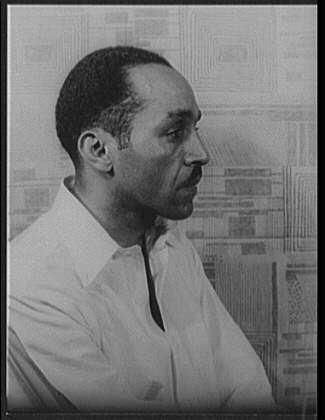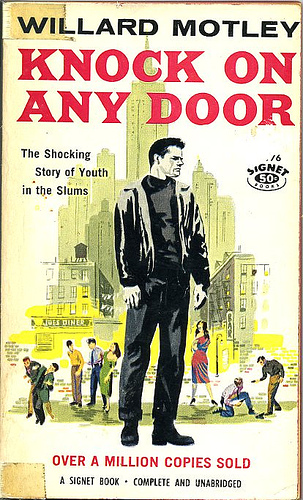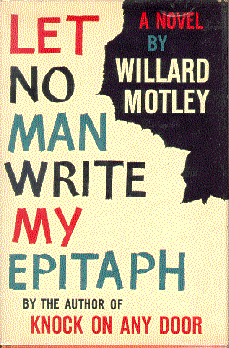Difference between revisions of "Queer Writers"
(ref) |
|||
| Line 1: | Line 1: | ||
| − | [[Image:Willard Motley.jpg|frame|none|This is the | + | [[Image:Willard Motley.jpg|frame|none|Willard Motley, Photograph by Carl Van Vechten, 1947/06/13, This image is available from the United States Library of Congress Prints and Photographs division under the digital ID van.5a52467]] |
| − | Willard Motley was an African-American writer who grew up | + | Willard Motley was an African-American writer who grew up in one of the only African-American families residing in Chicago's [http://en.wikipedia.org/wiki/Englewood,_Chicago Englewood neighborhood]. |
| − | The Chicago Defender published Motley's fiction when he was only 13 years old. He was then writing a weekly column called "Bud Says" under the pseudonym "Bud Billikin" (which then give the name to an annual Bud Billiken Parade and Picnic). | + | The Chicago Defender published Motley's fiction when he was only 13 years old. He was then writing a weekly column called "Bud Says" under the pseudonym "Bud Billikin" (which then give the name to an annual [http://en.wikipedia.org/wiki/Bud_Billiken_Parade_and_Picnic Bud Billiken Parade and Picnic]). |
| − | Motley lived near Maxwell Street Market, where he became associated with Hull House, In 1940 he wrote for the Works Progress Administration Federal Writers Project. | + | Motley lived near [http://en.wikipedia.org/wiki/Maxwell_Street Maxwell Street Market], where he became associated with [http://en.wikipedia.org/wiki/Hull_House Hull House], In 1940 he wrote for the [http://en.wikipedia.org/wiki/Works_Progress_Administration Works Progress Administration Federal Writers Project]. |
| − | In 1947 his first novel, Knock on Any Door, | + | In 1947 his first novel, Knock on Any Door, was critically acclaimed. In this novel, the main character, Nick, haunts West Madison Street and, to make money, allows himself to be picked up by gay men, described as “phonies.” |
| − | [[Image:1832237421_33afe0b5ef.jpg|frame|none| | + | [[Image:1832237421_33afe0b5ef.jpg|frame|none|Knock on Any Door, by Willard Motley, Published in 1947]] |
| Line 20: | Line 20: | ||
| − | [[Image:Wefishedallnight.gif|frame|none| | + | [[Image:Wefishedallnight.gif|frame|none|We Fished All Night, By Willard Motley, Published in 1951]] |
| Line 26: | Line 26: | ||
| − | [[Image:Letnomanepitaph.gif|frame|none| | + | [[Image:Letnomanepitaph.gif|frame|none|Let No Man Write My Epitaph, Published in 1960]] |
| − | On March 4, 1965, Motley died in Mexico City. | + | On March 4, 1965, Motley died in Mexico City.<ref> Fleming, Robert E.. "Knock on Any Door". The Literary Encyclopedia. 9 March 2001.</ref> |
| + | |||
| + | <references/> | ||
Revision as of 17:12, 17 March 2009
Willard Motley was an African-American writer who grew up in one of the only African-American families residing in Chicago's Englewood neighborhood.
The Chicago Defender published Motley's fiction when he was only 13 years old. He was then writing a weekly column called "Bud Says" under the pseudonym "Bud Billikin" (which then give the name to an annual Bud Billiken Parade and Picnic).
Motley lived near Maxwell Street Market, where he became associated with Hull House, In 1940 he wrote for the Works Progress Administration Federal Writers Project.
In 1947 his first novel, Knock on Any Door, was critically acclaimed. In this novel, the main character, Nick, haunts West Madison Street and, to make money, allows himself to be picked up by gay men, described as “phonies.”
His second novel, We Fished All Night, did not receive the same success. Motley moved to Mexico to start over.
His third novel, Let No Man Write My Epitaph continued the story of Knock on Any Door.
On March 4, 1965, Motley died in Mexico City.[1]
- ↑ Fleming, Robert E.. "Knock on Any Door". The Literary Encyclopedia. 9 March 2001.



